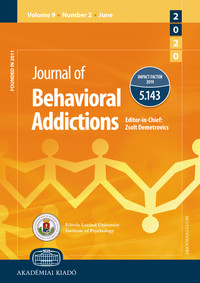Gamblers' attitudes towards money and their relationship to gambling disorder among young men
Gamblers' attitudes towards money and their relationship to gambling disorder among young men
Author(s): Pawel Sleczka, Barbara Braun-Michl, Ludwig KrausSubject(s): Behaviorism
Published by: Akadémiai Kiadó
Summary/Abstract: Background and aims. Money plays a central role in gambling, and understanding the different attitudes of gamblers towards it might benefit both prevention and treatment of gambling-related problems. This study describes the development of a new German measure of attitudes to money and the differences in these attitudes between male non-gamblers, occasional, frequent and problem gamblers. Furthermore, it investigates the cross-sectional and longitudinal associations between attitudes towards money and the severity of gambling disorder. Methods. An online study was conducted among 2,584 men aged 18–25 years, recruited via the Munich citizen registry. Additionally, a sample of n = 105 Facebook users was included in part of the analyses. Frequent and problem gamblers were invited to a 12-month follow-up. Apart from gambling participation and related problems, the questionnaire included items from existing scales measuring attitudes to money. Results. Three factors underlying a new 12-item German Scale of Money Attitudes (SMAG) were identified: success, budgeting and evil. Compared with other groups, participants reporting any gambling problems scored highest in success and lowest in budgeting. Budgeting was associated with gambling-related problems in both cross-sectional and longitudinal analyses and strengthened the relationship between associating money with success and gambling disorder. Discussion. For problem gamblers, money is important as a personal symbol of success. This attitude has an especially negative effect on gambling-related problems in individuals who handle money irresponsibly. Spending and winning money might play an important role in maintaining self-esteem among gamblers and thus hinder their attempts to quit.
Journal: Journal of Behavioral Addictions
- Issue Year: 9/2020
- Issue No: 3
- Page Range: 744-755
- Page Count: 12
- Language: English

